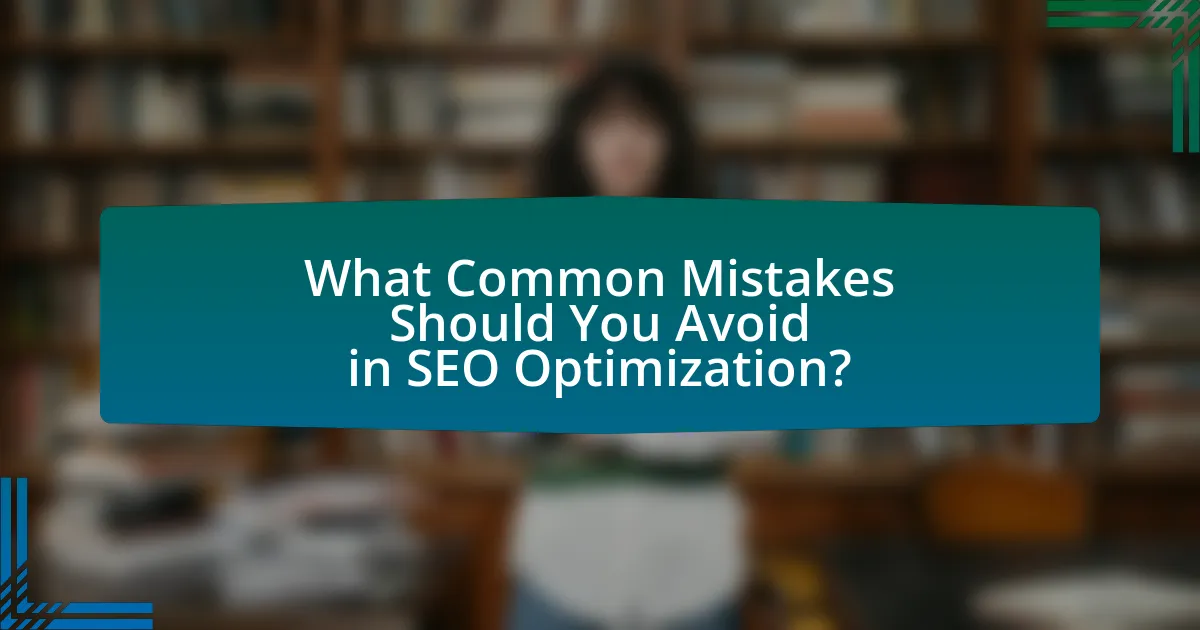The article focuses on optimizing author websites for SEO, emphasizing the importance of search engine visibility to attract organic traffic and engage potential readers. It outlines key components of SEO, including keyword optimization, quality content creation, and effective website structure, while also discussing the impact of SEO on reader engagement and retention. Additionally, the article highlights essential metrics for measuring SEO success, practical tips for maintaining SEO, and common mistakes to avoid, providing authors with a comprehensive guide to enhance their online presence and improve book sales.

What is SEO and Why is it Important for Author Websites?
SEO, or Search Engine Optimization, is the process of enhancing a website’s visibility on search engines to attract organic traffic. For author websites, effective SEO is crucial because it helps potential readers discover an author’s work through search queries. According to a study by HubSpot, 75% of users never scroll past the first page of search results, emphasizing the need for authors to rank higher to reach their audience. By optimizing content with relevant keywords, improving site structure, and ensuring mobile-friendliness, authors can significantly increase their chances of being found online, ultimately leading to greater book sales and reader engagement.
How does SEO impact the visibility of an author website?
SEO significantly enhances the visibility of an author website by improving its ranking on search engine results pages (SERPs). When an author implements effective SEO strategies, such as keyword optimization, quality content creation, and backlink building, their website becomes more likely to appear in relevant search queries. For instance, a study by Moz indicates that the top three organic search results receive over 60% of all clicks, demonstrating the importance of ranking high for visibility. Additionally, optimizing for local SEO can help authors reach specific audiences, further increasing their website’s exposure.
What are the key metrics used to measure SEO success?
The key metrics used to measure SEO success include organic traffic, keyword rankings, click-through rate (CTR), bounce rate, and conversion rate. Organic traffic quantifies the number of visitors arriving at a website through search engines, indicating the effectiveness of SEO strategies. Keyword rankings assess the position of targeted keywords in search engine results pages (SERPs), reflecting visibility and relevance. CTR measures the percentage of users who click on a website link after seeing it in search results, serving as an indicator of the effectiveness of meta titles and descriptions. Bounce rate indicates the percentage of visitors who leave a site after viewing only one page, providing insights into user engagement and content quality. Conversion rate tracks the percentage of visitors who complete desired actions, such as signing up for a newsletter or making a purchase, demonstrating the overall effectiveness of the website in achieving its goals.
How does SEO influence reader engagement and retention?
SEO significantly influences reader engagement and retention by improving the visibility and accessibility of content. When a website is optimized for search engines, it ranks higher in search results, attracting more visitors. According to a study by HubSpot, 75% of users never scroll past the first page of search results, indicating that higher visibility leads to increased traffic.
Moreover, effective SEO practices, such as using relevant keywords and optimizing page load speed, enhance user experience, which is crucial for keeping readers engaged. Research from Google shows that 53% of mobile site visitors abandon a page that takes longer than three seconds to load. This demonstrates that SEO not only brings readers to the site but also ensures they stay longer, thereby improving retention rates.
In summary, SEO enhances reader engagement and retention by increasing visibility and optimizing user experience, supported by data showing the importance of search rankings and site performance.
What are the fundamental components of SEO for author websites?
The fundamental components of SEO for author websites include keyword optimization, quality content creation, on-page SEO elements, mobile responsiveness, and backlink building. Keyword optimization involves researching and integrating relevant keywords that potential readers use in search engines, which helps improve visibility. Quality content creation focuses on producing engaging, informative, and original content that resonates with the target audience, as search engines prioritize valuable content. On-page SEO elements, such as title tags, meta descriptions, and header tags, enhance the website’s structure and make it easier for search engines to index the site. Mobile responsiveness ensures that the website functions well on various devices, which is crucial since over half of web traffic comes from mobile users. Lastly, backlink building involves acquiring links from reputable sites, which boosts the website’s authority and search ranking. These components collectively enhance the discoverability and user experience of author websites.
What role do keywords play in optimizing an author website?
Keywords are essential for optimizing an author website as they enhance visibility in search engine results. By strategically incorporating relevant keywords into website content, authors can align their pages with the search queries of potential readers. This alignment increases the likelihood of attracting organic traffic, as search engines prioritize content that matches user intent. Research indicates that 70% of online experiences begin with a search engine, underscoring the importance of effective keyword usage in driving audience engagement and improving overall site performance.
How does website structure affect SEO performance?
Website structure significantly affects SEO performance by influencing how search engines crawl and index a site. A well-organized website structure enhances user experience and improves the likelihood of higher rankings in search engine results. For instance, a clear hierarchy with logical navigation allows search engines to understand the relationship between pages, which can lead to better indexing. According to a study by Moz, sites with a clear structure and optimized internal linking can achieve up to 50% more organic traffic compared to poorly structured sites. This demonstrates that effective website structure is crucial for maximizing SEO performance.

How Can You Optimize Your Author Website for SEO?
To optimize your author website for SEO, focus on keyword research, quality content, and technical SEO. Conduct keyword research to identify relevant terms that potential readers use, and incorporate these keywords naturally into your website’s content, titles, and meta descriptions. Quality content should be engaging, informative, and regularly updated to keep visitors returning, which can improve your site’s ranking. Technical SEO involves ensuring your website is mobile-friendly, has fast loading times, and uses proper URL structures. According to a study by Backlinko, websites that load within 2 seconds have a significantly lower bounce rate, which positively impacts SEO rankings.
What are the best practices for keyword research?
The best practices for keyword research include identifying relevant keywords, analyzing search intent, utilizing keyword tools, and assessing competition. Identifying relevant keywords involves brainstorming terms that potential readers might use to find your content. Analyzing search intent ensures that the keywords align with what users are actually looking for, whether it’s informational, navigational, or transactional. Utilizing keyword tools like Google Keyword Planner or SEMrush provides data on search volume and trends, which helps in selecting effective keywords. Assessing competition involves examining how difficult it may be to rank for specific keywords by analyzing the top-ranking pages for those terms. These practices are essential for optimizing an author website for SEO, as they directly influence visibility and traffic.
How can you identify the right keywords for your niche?
To identify the right keywords for your niche, conduct thorough keyword research using tools like Google Keyword Planner, Ahrefs, or SEMrush. These tools provide data on search volume, competition, and related keywords, allowing you to pinpoint terms that your target audience frequently searches for. For instance, a study by Ahrefs found that 90.63% of pages receive no organic traffic from Google, highlighting the importance of selecting effective keywords to improve visibility. Additionally, analyzing competitors’ websites can reveal successful keywords they rank for, providing further insights into your niche’s keyword landscape.
What tools can assist in effective keyword research?
Effective keyword research can be assisted by tools such as Google Keyword Planner, SEMrush, Ahrefs, and Ubersuggest. Google Keyword Planner provides insights into search volume and competition for keywords, making it essential for identifying relevant terms. SEMrush offers comprehensive keyword analysis, including keyword difficulty and related keywords, which helps in strategic planning. Ahrefs is known for its extensive database and ability to analyze competitors’ keywords, providing valuable insights for content optimization. Ubersuggest offers keyword suggestions and SEO metrics, making it user-friendly for beginners. These tools collectively enhance the keyword research process by providing data-driven insights that inform SEO strategies.
How can on-page SEO be improved for an author website?
On-page SEO for an author website can be improved by optimizing title tags, meta descriptions, and content structure. Title tags should include the author’s name and relevant keywords, while meta descriptions must be compelling and accurately summarize the page content to enhance click-through rates. Additionally, using header tags (H1, H2, H3) to organize content improves readability and helps search engines understand the hierarchy of information.
Incorporating relevant keywords naturally throughout the content, including in image alt texts, also boosts SEO. Furthermore, ensuring that the website is mobile-friendly and has fast loading times contributes to better user experience and search rankings. According to Google, mobile-friendliness is a significant ranking factor, and sites that load quickly tend to retain visitors longer, reducing bounce rates.
What elements should be optimized on each webpage?
Each webpage should optimize the following elements: title tags, meta descriptions, header tags, content quality, image alt text, URL structure, internal linking, and mobile responsiveness. Title tags should be concise and include relevant keywords, as they directly impact search engine rankings. Meta descriptions should summarize the page content effectively, enticing users to click through. Header tags (H1, H2, H3) should organize content hierarchically, improving readability and SEO. High-quality content that provides value to readers is essential for engagement and ranking. Image alt text should describe images accurately, aiding accessibility and SEO. URL structure should be clean and keyword-rich, enhancing user experience and search visibility. Internal linking helps distribute page authority and keeps users engaged. Lastly, mobile responsiveness is crucial, as over 50% of web traffic comes from mobile devices, according to Statista.
How does content quality affect on-page SEO?
Content quality significantly impacts on-page SEO by influencing user engagement, dwell time, and search engine rankings. High-quality content attracts more visitors, encourages them to stay longer on the page, and reduces bounce rates, all of which are positive signals to search engines. According to a study by Backlinko, pages with longer content tend to rank higher in search results, indicating that comprehensive, well-researched articles are favored by algorithms. Additionally, quality content is more likely to earn backlinks from other websites, further enhancing its SEO value.
What off-page SEO strategies should authors consider?
Authors should consider building backlinks, engaging in social media marketing, and participating in online communities as effective off-page SEO strategies. Backlinks from reputable websites enhance domain authority and improve search engine rankings, as evidenced by studies showing that higher-quality backlinks correlate with better visibility in search results. Social media marketing increases content reach and drives traffic to the author’s website, with platforms like Facebook and Twitter being instrumental in audience engagement. Additionally, participating in online communities, such as forums or writing groups, allows authors to establish credibility and attract potential readers, further enhancing their online presence and SEO performance.
How can backlinks enhance your website’s authority?
Backlinks enhance your website’s authority by signaling to search engines that your content is credible and valuable. When reputable websites link to your site, it indicates to search engines like Google that your content is trustworthy, which can improve your rankings in search results. According to a study by Moz, backlinks are one of the top three ranking factors for SEO, demonstrating their critical role in establishing authority. Additionally, a higher number of quality backlinks correlates with increased organic traffic, further solidifying your website’s standing in your niche.
What role do social media and online presence play in off-page SEO?
Social media and online presence significantly enhance off-page SEO by increasing brand visibility and driving traffic to websites. When content is shared on social media platforms, it generates backlinks and referral traffic, which are critical factors for search engine ranking. According to a study by Moz, social signals, such as likes and shares, correlate with higher search engine rankings, indicating that a strong social media presence can positively influence SEO outcomes. Additionally, an active online presence fosters engagement and community building, which can lead to more organic mentions and links from other websites, further boosting off-page SEO effectiveness.

What Common Mistakes Should You Avoid in SEO Optimization?
Common mistakes to avoid in SEO optimization include neglecting keyword research, failing to optimize for mobile devices, and overlooking the importance of quality content. Neglecting keyword research can lead to targeting irrelevant terms, which diminishes visibility; studies show that 70% of online experiences begin with a search engine, emphasizing the need for effective keyword strategies. Failing to optimize for mobile devices is critical, as over 50% of web traffic comes from mobile users, and Google prioritizes mobile-friendly sites in its rankings. Lastly, overlooking quality content can result in high bounce rates; research indicates that 60% of consumers prefer to engage with well-written content, which enhances user experience and boosts SEO performance.
What are the pitfalls of keyword stuffing?
Keyword stuffing can lead to significant penalties from search engines, resulting in lower rankings or even removal from search results. This practice disrupts the natural flow of content, making it difficult for readers to engage with the material. Search engines like Google prioritize user experience and quality content; therefore, sites that excessively use keywords may be flagged for manipulation. According to Google’s Webmaster Guidelines, content should be created primarily for users, not for search engines, emphasizing the importance of relevance and readability over keyword density.
How can keyword stuffing negatively impact your SEO?
Keyword stuffing can negatively impact your SEO by leading to penalties from search engines, which can result in lower rankings or even removal from search results. When a website excessively uses keywords in an unnatural manner, it creates a poor user experience, causing visitors to leave the site quickly. This high bounce rate signals to search engines that the content is not valuable, further diminishing its ranking potential. According to Google’s Search Quality Evaluator Guidelines, content should be created primarily for users, not for search engines, emphasizing the importance of quality over quantity in keyword usage.
What are the signs that you may be over-optimizing your content?
Signs that you may be over-optimizing your content include keyword stuffing, unnatural readability, and a decline in user engagement metrics. Keyword stuffing occurs when keywords are excessively used, making the content awkward and difficult to read. Unnatural readability is evident when the content feels forced or lacks a natural flow, which can deter readers. A decline in user engagement metrics, such as increased bounce rates or decreased time on page, indicates that users are not finding the content valuable or enjoyable. These signs suggest that the content may be overly optimized for search engines at the expense of user experience.
How can poor website design affect SEO?
Poor website design negatively impacts SEO by hindering user experience and reducing site accessibility. When a website is poorly designed, it often leads to high bounce rates, as users quickly leave sites that are difficult to navigate or visually unappealing. According to a study by Google, 53% of mobile users abandon sites that take longer than three seconds to load, which is often a result of inefficient design. Additionally, poor design can affect the website’s mobile-friendliness, a critical ranking factor, as Google prioritizes mobile-optimized sites in search results. Furthermore, a lack of clear structure and intuitive navigation can prevent search engines from effectively crawling and indexing the site, ultimately diminishing its visibility in search results.
What design elements are crucial for SEO performance?
Crucial design elements for SEO performance include responsive design, site speed, and user-friendly navigation. Responsive design ensures that websites function well on various devices, which is essential since Google prioritizes mobile-friendly sites in its rankings. Site speed is critical as faster-loading pages lead to lower bounce rates and improved user experience, directly influencing search rankings; studies show that a one-second delay in loading time can reduce conversions by 7%. User-friendly navigation enhances the overall experience, allowing visitors to find information quickly, which can lead to longer session durations and lower bounce rates, both of which are favorable for SEO.
How does mobile optimization influence search rankings?
Mobile optimization significantly influences search rankings by enhancing user experience on mobile devices, which is a critical factor in Google’s ranking algorithms. Google prioritizes mobile-friendly websites in its search results, particularly since the introduction of mobile-first indexing, where the mobile version of a site is considered the primary version. According to a study by Google, 53% of mobile users abandon sites that take longer than three seconds to load, indicating that site speed and mobile usability directly impact user engagement and, consequently, search rankings. Therefore, optimizing for mobile not only improves user retention but also aligns with search engine criteria, leading to better visibility in search results.

What Practical Tips Can Help You Maintain SEO for Your Author Website?
To maintain SEO for your author website, regularly update your content with relevant keywords and ensure mobile optimization. Regularly updating content keeps your site fresh, which search engines favor, while mobile optimization is crucial as over 50% of web traffic comes from mobile devices. Additionally, using tools like Google Analytics can help track your website’s performance and identify areas for improvement, ensuring that your SEO strategies are effective and aligned with user behavior.
How often should you update your content for SEO benefits?
You should update your content for SEO benefits at least every six months. Regular updates help maintain relevance and improve search engine rankings, as search engines favor fresh and updated content. According to a study by HubSpot, websites that regularly update their content see a 55% increase in website traffic. This frequency allows you to incorporate new keywords, address changing audience needs, and enhance user engagement, all of which contribute positively to SEO performance.
What types of content updates are most beneficial for SEO?
Regularly updating content with fresh, relevant information is most beneficial for SEO. This includes adding new blog posts, updating existing articles with current data, and optimizing for keywords that reflect current search trends. For instance, Google prioritizes websites that provide up-to-date content, as indicated by its algorithm updates that favor freshness in search results. Additionally, incorporating multimedia elements like images and videos can enhance user engagement, which is a factor in SEO rankings.
How can regular blogging improve your website’s SEO?
Regular blogging can significantly improve your website’s SEO by increasing the frequency of fresh content, which search engines prioritize. Each new blog post creates an opportunity for indexing, allowing search engines to discover and rank your site more effectively. Additionally, consistent blogging enhances keyword optimization, as it enables the inclusion of relevant keywords and phrases that potential visitors are searching for. According to HubSpot, companies that blog receive 97% more links to their websites, which boosts domain authority and improves search rankings. Furthermore, engaging content encourages user interaction, reducing bounce rates and increasing time spent on the site, both of which are positive signals to search engines.
What are the best tools for monitoring your SEO performance?
The best tools for monitoring your SEO performance include Google Analytics, SEMrush, Ahrefs, Moz, and Google Search Console. Google Analytics provides comprehensive data on website traffic and user behavior, allowing for in-depth analysis of SEO efforts. SEMrush offers keyword tracking, site audits, and competitive analysis, making it a robust tool for SEO monitoring. Ahrefs is known for its backlink analysis and keyword research capabilities, providing insights into site performance. Moz offers tools for tracking rankings and site health, while Google Search Console helps monitor site visibility and performance in Google search results. These tools are widely recognized in the industry for their effectiveness in tracking and improving SEO performance.
How can analytics tools help you track SEO progress?
Analytics tools help track SEO progress by providing measurable data on website performance, keyword rankings, and user behavior. These tools, such as Google Analytics and SEMrush, allow users to monitor organic traffic, identify which keywords drive visitors, and analyze bounce rates and session durations. For instance, Google Analytics reports show how many users visit a site from search engines, while SEMrush tracks keyword positions over time, enabling authors to assess the effectiveness of their SEO strategies. This data-driven approach facilitates informed decision-making, allowing authors to refine their content and optimize their websites for better search engine visibility.
What metrics should you focus on for ongoing SEO improvement?
For ongoing SEO improvement, focus on organic traffic, keyword rankings, and conversion rates. Organic traffic indicates the number of visitors coming from search engines, reflecting the effectiveness of your SEO strategies. Keyword rankings show how well your website performs for targeted search terms, which is crucial for visibility. Conversion rates measure the percentage of visitors who complete desired actions, such as signing up for a newsletter or purchasing a book, demonstrating the effectiveness of your content and user experience. Monitoring these metrics allows for data-driven adjustments to enhance SEO performance.



